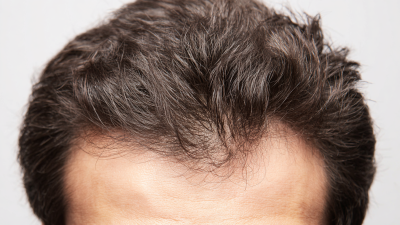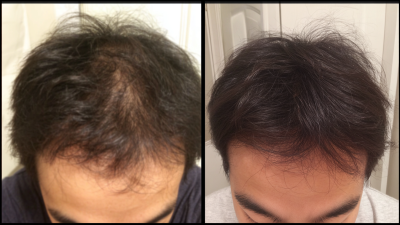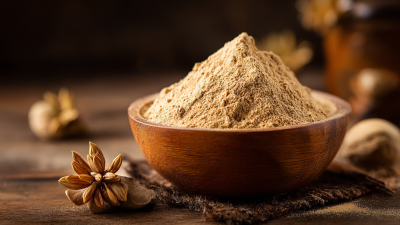
-
Home
-
Products
-
About US
-
FAQ
-
News
-
Tips
-
Contact Us
Leave Your Message
- Phone
- E-mail
- WhatsApp
- WA Business



In the quest for healthier and more vibrant hair, the spotlight on Folic Acid Hair Growth has never been brighter. Current research indicates that folic acid, a B-vitamin also known as vitamin B9, plays a crucial role in cellular division and regeneration, which directly impacts hair follicle health. According to a report from the Journal of Dermatology, deficiencies in folic acid can lead to hair thinning and loss, highlighting its importance in hair care regimens. Moreover, a study by the International Journal of Trichology suggests that an adequate intake of folic acid can enhance hair density and stimulate growth, providing a vital foundation for hair restoration. As more individuals turn to nutritional solutions for hair vitality, understanding how to effectively incorporate folic acid can unlock the potential for improved hair growth outcomes, bridging the gap between diet and hair health.

Folic acid, a vital nutrient often associated with prenatal care, plays a significant role beyond supporting pregnancy; it is an essential contributor to hair growth and overall hair health. This B vitamin aids in the production of red blood cells, which is crucial for delivering oxygen to hair follicles. Enhanced blood circulation to these follicles can stimulate hair growth, making folic acid a key player in achieving luscious locks. Including folic acid-rich foods such as leafy greens, beans, and fortified cereals in your diet could provide the support your hair desperately needs.
Moreover, deficiencies in essential vitamins, including folic acid, can lead to hair loss. Studies have indicated that a well-balanced diet consisting of vital nutrients like vitamin D, B-complex vitamins, and omega-3 fatty acids can help maintain hair vitality and prevent thinning. As individuals seek to improve their hair health, integrating supplements such as folic acid can be a practical approach, especially for those experiencing hair thinning or loss. Emphasizing a nutrient-rich diet can foster an environment conducive to robust hair growth.
| Nutritional Component | Recommended Daily Intake (RDI) | Sources | Impact on Hair Growth |
|---|---|---|---|
| Folic Acid | 400 mcg | Leafy greens, citrus fruits, beans, and fortified grains | Supports cell division, promotes hair follicle health |
| Vitamin B12 | 2.4 mcg | Meat, dairy products, eggs | Enhances iron absorption, essential for hair growth |
| Iron | 18 mg | Red meat, lentils, spinach | Improves oxygen delivery to hair follicles |
| Zinc | 11 mg | Nuts, seeds, whole grains | Contributes to hair tissue growth and repair |
| Biotin | 30 mcg | Eggs, almonds, sweet potatoes | Promotes keratin production, strengthens hair |
Folic acid, a vital B vitamin, plays a crucial role in the hair growth cycle by promoting overall cell health and regeneration. Acting as a cofactor for various biochemical processes, it ensures that the cells responsible for hair growth, particularly those in the hair follicles, receive the necessary nutrients to function optimally. A deficiency in folic acid can lead to weakened strands and slower growth, making it an essential component for individuals seeking to enhance their hair health.
In addition to supporting the growth phase of hair, folic acid aids in the synthesis of DNA and RNA, which are fundamental for producing new hair cells. This vitamin encourages increased blood circulation to the scalp, delivering oxygen and essential nutrients directly to the hair follicles. Consequently, a diet rich in folic acid, obtained from foods such as leafy greens, nuts, and fortified cereals, can significantly enhance hair growth results. By understanding the pivotal role of folic acid in the hair growth cycle, individuals can better appreciate its importance in maintaining healthy, lush hair.

Folic acid, a vital member of the B-vitamin family, plays a crucial role in the production of DNA and RNA and is essential for cell division. Its significance in hair health is underscored by studies revealing that deficiencies in folate can lead to hair thinning and loss. According to a report published in the Journal of Dermatology, women with alopecia areata showed notably lower levels of folic acid compared to those with healthy hair. This correlation emphasizes the importance of obtaining adequate folic acid through diet to promote optimal hair growth.

Top dietary sources of folic acid include leafy green vegetables, such as spinach and kale, which are rich in this essential vitamin. Additionally, beans, lentils, and peas serve as excellent plant-based sources, providing a substantial amount of folate. Fortified cereals and grains also contribute significantly, particularly for those who may find it challenging to consume enough fresh fruits and vegetables daily. The National Institutes of Health suggests that adults should aim for at least 400 micrograms of dietary folate equivalents (DFE) each day to support not only hair growth but also overall health, making these food choices crucial for those aiming to enhance their hair vitality naturally.
Folic acid, a vital B-vitamin, plays a crucial role in various bodily functions, including healthy hair growth. When it comes to enhancing hair vitality, effective supplementation strategies can make a significant difference. One approach is to incorporate folic acid into your daily routine through dietary sources, such as leafy greens, legumes, and fortified cereals. These foods are not only rich in folate but also provide essential nutrients that contribute to overall hair health.
In addition to dietary intake, considering a well-balanced supplement can enhance your folic acid levels. Opt for a high-quality multivitamin that includes folic acid and consult with a healthcare professional to determine the appropriate dosage based on your individual needs. Combining supplementation with adequate hydration and a nutritious diet can optimize your results, ensuring that your hair receives the necessary support to grow stronger and healthier. Remember, consistency is key; make folic acid a staple of your hair care routine for the best outcomes.
This bar chart illustrates the effect of folic acid supplementation on hair growth over a period of three months. The data shows a marked increase in hair growth rate, peaking at 25 mm/month after three months of consistent supplementation.
Folic acid, a B-vitamin essential for DNA synthesis and repair, has gained attention for its role in promoting hair growth. When combined with other nutrients, its efficacy can be significantly enhanced. According to a study published in the Journal of Dermatology, a combination of folic acid, biotin, and zinc not only promotes healthier hair growth but also strengthens hair follicles. The study revealed that participants who supplemented with this nutrient trio experienced a 35% increase in hair thickness over 12 weeks, highlighting the synergistic effect these nutrients have on hair health.
Additionally, incorporating vitamins A and E along with folic acid can further amplify results. Research conducted by the International Journal of Trichology showed that a diet rich in these vitamins led to improved blood circulation in the scalp, enhancing nutrient absorption. Participants who followed this nutrient-rich regimen reported a 40% improvement in hair density within three months. By strategically combining folic acid with these essential nutrients, individuals looking to boost their hair growth may find a more effective and holistic approach to achieving their hair goals.





